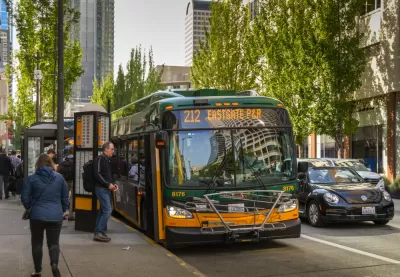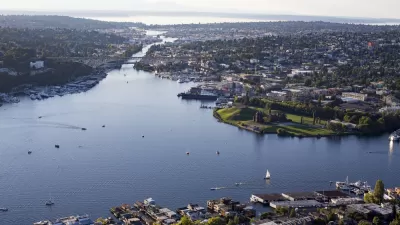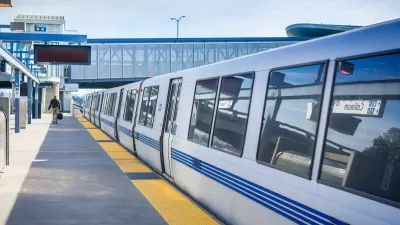Agency staff says the Puget Sound regional long-range plan won’t achieve 2030 sustainability goals set by the state.

The recently adopted Puget Sound Regional Council (PSRC) long range transportation plan won’t do enough to meet the region’s 2030 climate goals, reports Ryan Packer for The Urbanist. This is according to a report from the Council’s own staff, which revealed “a projected 13% gap between anticipated emissions and the goal of reaching a 50% reduction of the region’s 1990 greenhouse gas emissions by 2030, even with the help of numerous newly adopted statewide climate policies.”
Packer outlines the analysis made by PSRC staff, which claims that nixing planned road expansion projects in the region would not reduce emissions because that would increase congestion, a claim labeled by The Urbanist as “myth #1 on our list of five wrong planning claims around highway expansion that are causing the US to fail to make progress on its climate goals.” The predictive models used by PSRC also claim that improving transit wouldn’t make much impact, assuming that people would continue to drive at roughly the same rate, and that the most impactful initiative would be a per-mile road charge, an action that would require legislative action at the state level.
These predictions matter because the analysis is meant to inform how federal funding is allocated. “If the models show accelerating transit investments gets the region closer to its climate goals, there will be an effort to tilt funding in that direction.”
FULL STORY: Adopted Regional Transportation Plan Isn’t Aligned With 2030 Climate Goals

Trump Administration Could Effectively End Housing Voucher Program
Federal officials are eyeing major cuts to the Section 8 program that helps millions of low-income households pay rent.

Planetizen Federal Action Tracker
A weekly monitor of how Trump’s orders and actions are impacting planners and planning in America.

Ken Jennings Launches Transit Web Series
The Jeopardy champ wants you to ride public transit.

Opinion: Transit Agencies Must View Service Cuts as Last Resort
Reducing service could cripple transit systems by pushing more riders to consider car ownership, making future recovery even less certain.

‘Smart Surfaces’ Policy Guide Offers Advice for Building and Maintaining Urban Tree Canopies
Healthy, robust tree canopies can reduce the impacts of extreme heat and improve air quality.

New Jersey Lawsuit Targets Rent-Setting Algorithms
The state of New Jersey is taking legal action against landlords and companies that engage in what the state’s Attorney General alleges is illegal rent fixing.
Urban Design for Planners 1: Software Tools
This six-course series explores essential urban design concepts using open source software and equips planners with the tools they need to participate fully in the urban design process.
Planning for Universal Design
Learn the tools for implementing Universal Design in planning regulations.
Heyer Gruel & Associates PA
Ada County Highway District
Institute for Housing and Urban Development Studies (IHS)
City of Grandview
Harvard GSD Executive Education
Toledo-Lucas County Plan Commissions
Salt Lake City
NYU Wagner Graduate School of Public Service





























